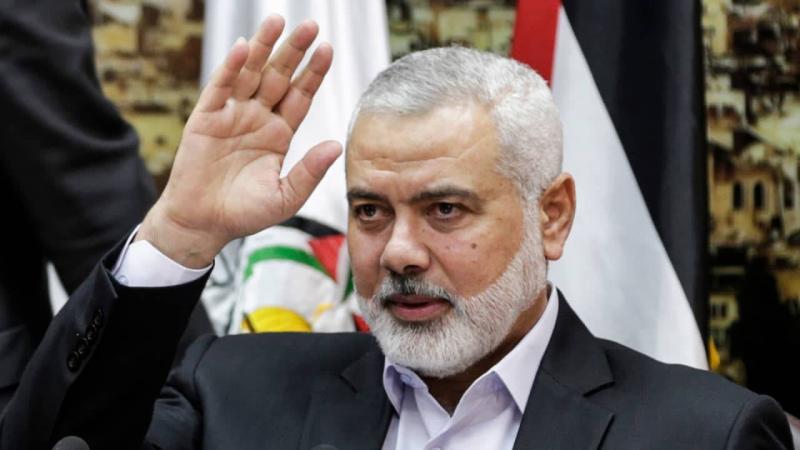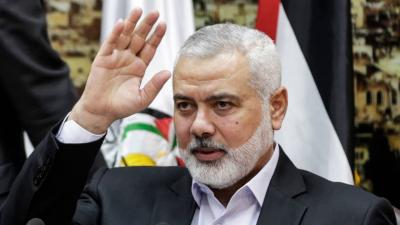The Hamas movement announced today, Wednesday, the assassination of its Political Bureau Chief Ismail Haniya in Tehran after participating in the inauguration of the new Iranian president, Masoud Bezhkian.
**Who is Ismail Haniya?**
Ismail Haniya, the Hamas Political Bureau Chief residing in voluntary exile between Qatar and Tehran, is described by observers as a "calm" figure with a "serious and open" discourse toward various factions, including those competing with his movement. However, his properties outside Gaza, the extent of his wealth and its sources, as well as his political ambitions in Palestinian territories raise several questions. The United States included him on its "terrorists" list in 2018. His name came back into the international media spotlight following Hamas's attack on Israel, which resulted in hundreds of casualties, and Israel's response with deadly airstrikes that led to the deaths of over 3,700 people.
Ismail Haniya, 60 years old, was elected as the head of Hamas' political bureau in 2017, succeeding Khaled Mashal. However, his name and nickname (Abu al-Abd) became known to the world in 2006 when he assumed the role of Prime Minister in the Palestinian Authority after Hamas's surprising victory in the parliamentary elections. The understanding with the Fatah movement, led by President Mahmoud Abbas, did not last long, as Hamas seized control of the Gaza Strip by force the following year.
Haniya, who has been living in voluntary exile between supportive countries such as Qatar and Turkey, has long called for a combination of armed resistance and political struggle within Hamas, which is classified as a "terrorist" organization by the United States, the European Union, and Israel. He also maintains good relations with leaders of various Palestinian factions, even those opposing his movement. He was arrested multiple times by Israel, most notably in 1989, and was exiled with several Hamas leaders to southern Lebanon in 1992.
**His Background, Education, and Political Activity**
Ismail Abdul Salam Ahmad Haniya was born on January 23, 1962, in the Beach refugee camp in Gaza, where his family sought refuge from the village of Al-Jura in Ashkelon in 1948. He received his primary and preparatory education in schools run by the UNRWA before obtaining his secondary education from Al-Azhar Institute. He then enrolled at the Islamic University of Gaza in 1987, graduating with a degree in Arabic literature, and became its dean in 1992. In 1997, he took over the office of Sheikh Ahmed Yassin after his release by Israel.
**His Wealth and Funding Sources**
The Times estimated the wealth of Hamas's political bureau chief at about four billion dollars. The newspaper, which interviewed Haniya last year, stated that Iran funds the Palestinian movement's leaders with $100 million annually. It also pointed out that Palestinian opinion polls predicted Haniya as the most likely candidate to succeed Mahmoud Abbas as president of the Palestinian Authority. A survey conducted by the Palestinian Center for Policy and Research in September indicated that if new elections were held, Haniya would receive 58% of the votes compared to only 37% for Abbas.
Immediately after Hamas launched the "Al-Aqsa Flood" operation on Saturday, October 7, the most sudden and deadliest attack since the establishment of Israel, Haniya later stated, "We are destined for a great victory," and continued, "Enough is enough; we must complete the series of uprisings and revolutions with a liberation battle."
Haniya has consistently highlighted the threats faced by Al-Aqsa Mosque in Jerusalem, the ongoing Israeli blockade on Gaza, and the normalization of relations between Israel and regional countries. After Israel launched attacks on the Gaza Strip and urged its residents to evacuate the northern region and flee south, Haniya described Israel's "aggression" against Gaza as "war crimes," calling for pressure on the Israeli authorities "to immediately stop these crimes and respect the commitments of international humanitarian law." He stressed that "there will be no migration from the Gaza Strip," adding, "The people of Gaza are rooted in their land; they will not leave Gaza; they will not migrate no matter what you do, killers, criminals."
It is worth noting that the political leadership of Hamas relies on two figures: Ismail Haniya from abroad and Yahya Sinwar, his counterpart in Gaza, who is seen as a symbol of the hardline wing of the movement. The Izz ad-Din al-Qassam Brigades, the military arm of the movement, is led by Mohammed Deif, a figure who rarely appears publicly and has repeatedly survived Israeli assassination attempts. Haniya's last appearance was on Tuesday, where he met with Iranian President Masoud Bezhkian in the Iranian capital Tehran for the first time since the latter's inauguration.




